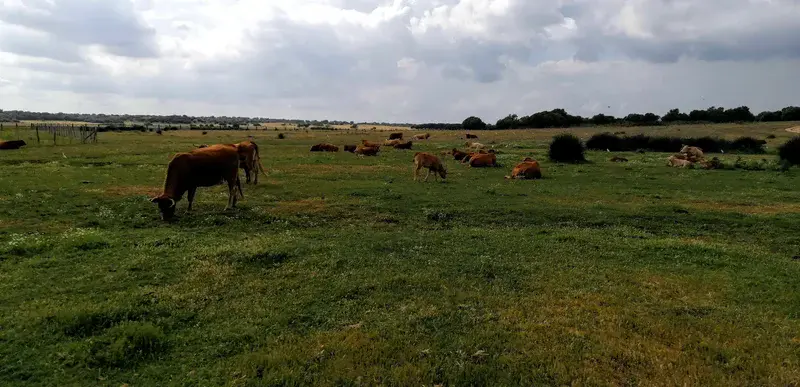
When the cows come home
by Antonio Jordán, University of Seville, Sevilla, Spain
First, in English:
Herbivores play a crucial role in the soil system, as their activity has significant effects on the structure and health of this ecosystem. There are many important aspects of the role of herbivores in the soil. Herbivores, by feeding on plants, contribute to the nutrient cycle in the soil. Through ingestion and subsequent excretion, they return organic matter to the soil in the form of manure. This manure is rich in essential nutrients such as nitrogen, phosphorus, and potassium, enriching soil fertility and promoting plant growth.
The activity of herbivores, such as certain insects and mammals that burrow, like moles, rabbits, or mice, can contribute to soil aeration. Their movements help break up soil compaction, improving permeability and facilitating the absorption of water and nutrients by plant roots.
Herbivores also play a role in the dynamics of vegetation. By selecting certain types of plants over others, they can influence the composition of the plant community in a given area, which, in turn, affects the diversity and structure of the soil ecosystem.
In natural environments, herbivores often act as regulators of vegetation. Grazing can prevent the excessive proliferation of certain plants, thus avoiding undue competition for resources such as sunlight and soil nutrients.
Finally, herbivores are integral parts of food chains and trophic networks in ecosystems. Their presence and activity affect not only plants but also the predators that feed on them. This creates a dynamic balance in the soil ecosystem.
Ahora, en español:
Los herbívoros desempeñan un papel crucial en el sistema del suelo, ya que su actividad tiene efectos significativos en la estructura y la salud de este ecosistema. Hay muchos aspectos importantes del papel de los herbívoros en el suelo. Los herbívoros, al alimentarse de plantas, contribuyen al ciclo de nutrientes en el suelo. A través de la ingestión y posterior excreción, devuelven materia orgánica al suelo en forma de estiércol. Este estiércol es rico en nutrientes esenciales, como nitrógeno, fósforo y potasio, que enriquece la fertilidad del suelo y favorece el crecimiento de las plantas.
La actividad de herbívoros como ciertos insectos y mamíferos que excavan, como topos, conejos o ratones, puede contribuir a la aireación del suelo. Sus movimientos ayudan a romper la compactación del suelo, mejorando así la permeabilidad y facilitando la absorción de agua y nutrientes por parte de las raíces de las plantas.
Los herbívoros también desempeñan un papel en la dinámica de la vegetación. Al seleccionar ciertos tipos de plantas sobre otras, pueden afectar la composición de la comunidad vegetal en un área determinada, lo que, a su vez, influye en la diversidad y estructura del ecosistema del suelo.
En entornos naturales, los herbívoros a menudo actúan como reguladores de la vegetación. El pastoreo puede prevenir la proliferación excesiva de ciertas plantas, evitando así la competencia desmedida por recursos como la luz solar y los nutrientes del suelo.
Finalmente, los herbívoros son parte integral de las cadenas alimentarias y las redes tróficas en los ecosistemas. Su presencia y actividad afectan no solo a las plantas sino también a los depredadores que se alimentan de ellos. Esto crea un equilibrio dinámico en el ecosistema del suelo.
Categories
Location
- Europe (3885)
- Southern Europe (1685)
- Spain (813)
- Exact location (-6.3044 W, 37.2453 N)
Tags
Colours
Image properties
4000 × 1936 px;
image/jpeg; 1.6 MB
Camera:
Huawei MAR-LX1A
Taken on 25
April
2021
Submitted on 18 January 2024
Licence
Creative Commons Attribution-ShareAlike 3.0 Unported (CC BY-SA 3.0)
Credit
Antonio Jordán (distributed via imaggeo.egu.eu)
Share
Appreciate
Report